Update 46
Focus on CSR
Cosying up to charities
Partnering with high profile charities is a key CRS strategy. 2013 saw two new partnerships that could affect infant health: World Vision International with DSM (a major manufacturer of formula ingredients) and Save the Children UK with Glaxo Smith Kline (GSK).
BBC’s Panorama, All in a good Cause, broadcast on December 2013, examined this trend, interviewing Justin Forsyth, Save the Children UK’s CEO and Dominic Nutt, its former Head of News.
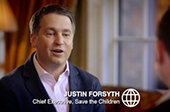 Justin Forsyth on BBC PanoramaIn the last 3 years its income from corporations has gone up 5-fold from £3.9m to £21m in 2013, 8% of its total. The GSK deal, worth £15m over 3 years, could, according to Justin Forsyth, save ‘millions’ of children’s lives. Dominic Nutt explained how the move from small donors to corporate funding can impact on charities’ willingness to criticise potential funders: ‘People are beginning to edit themselves, the culture has percolated right down and no one is willing to challenge that culture.’
Justin Forsyth on BBC PanoramaIn the last 3 years its income from corporations has gone up 5-fold from £3.9m to £21m in 2013, 8% of its total. The GSK deal, worth £15m over 3 years, could, according to Justin Forsyth, save ‘millions’ of children’s lives. Dominic Nutt explained how the move from small donors to corporate funding can impact on charities’ willingness to criticise potential funders: ‘People are beginning to edit themselves, the culture has percolated right down and no one is willing to challenge that culture.’
● The partnership may involve the development of a nutrition product for babies. We really hope not. These issues are complex and tying fundraising to products has many risks and can distort an agency’s priorities (see pgs 24, 31).
● The Advertising Standards Council of India upheld a complaint against GSK’s claims for Junior Horlicks and children’s brain development.
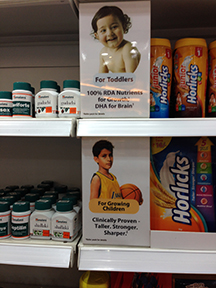 GSK Junior Horlicks promotion in IndiaGSK Display for Junior Horlicks for toddlers, Delhi, Nov 2013
GSK Junior Horlicks promotion in IndiaGSK Display for Junior Horlicks for toddlers, Delhi, Nov 2013
Focus on CSR
Corporate Social Responsibility (CSR) scams
Companies with the poorest reputations, such as Nestlé, tend to produce the highest number of Corporate Social Responsibility (CSR) reports - all of them claiming a positive impact on society.1 CSR reporting helps companies build trust and promotes the notion that self-monitored, voluntary codes are preferable to regulation.
The World Economic Forum (WEF) whose chair is also Nestlé’s chair, Peter Brabeck-Letmathe, is a major player in the promotion of CSR and businesses. WEF’s Global Redesign Initiative proposes that some issues are taken off the agenda of the UN system and are addressed instead by ‘plurilateral, often multi-stakeholder, coalitions of the willing and the able.’ WEF envisages a world managed by a coalition of multinational corporations, nation states (including through the UN System) and select civil society organisations.
The Guidelines of the Framework Convention on Tobacco recognise that CSR is a form of marketing. Of course food is different, but perhaps its time that the risks of food industry CSR are recognised.
1 Corporate Critic database list Nestle with 647 reports, Unilever 362, Danone 127, Pepsi 179 and Coca Cola 219. Ethical Consumer Research Association gives Nestlé an Ethiscore rating of 1 on a scale from 0 (worst) to 15 (best).
2 See Holding Corporations Accountable in Global Obligations for the Right to Food and Governments should govern - corporations should follow the rules in UN Standing Committee on Nutrition journal.
Can CSR be fixed?
Richard Howitt MEP, the European Parliament Rapporteur on Corporate Social Responsibility (CSR) is steering a Non-Financial Reporting (NFR) Directive through Parliament to improve corporate reporting of ‘information relating to environment, society, respect for human rights, anti-corruption and diversity.’ This will require companies to report against recognised international standards – or explain why they have chosen not to do so. Whether this will improve the situation or give CSR an air of respectability it does not deserve remains to be seen.
WHO and commercial influence
GAIN - still a wolf in sheep’s clothing?
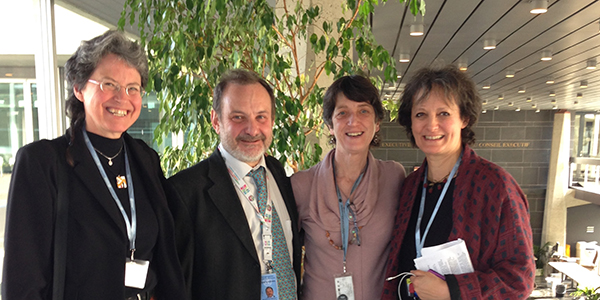 IBFAN and WHO after the Executive Board meeting, January 2014
IBFAN and WHO after the Executive Board meeting, January 2014
From the left above: Lida Lhotska, IBFAN regional Coordinator for Europe, Dr Francesco Branca, Director of WHO’s Dept for Nutrition, Dr Elizabeth Mason, Director, WHO Dept for Maternal, Newborn, Child and Adolescent Health and Patti Rundall, Baby Milk Action, IBFAN Co-Chair. Dr Branca said ‘We have been allied with IBFAN for many years and we now look forward to strengthening WHO’s commitment on the goal of increasing exclusive breastfeeding, and scaling up implementation of the International Code.’
The International Special Dietary Foods Industries (ISDI representing the feeding industry) lost its NGO status with WHO after 28 years, because WHO had not ‘received the deliverables expected during the collaboration period.’
ISDI and several other business front groups have enjoyed Official Relations status with WHO, even though this conflicts with current policy. This was due to inadequate implementation of WHO’s policy that defines NGOs as groups ‘free from concerns that are primarily of a commercial or profit-making nature.’ Unfortunately the ‘not-for profit’ legal status that many business groupings are registered under have managed to achieve has been mixed us with the ‘not working in the interest of profit-making’ status.
NGOs in Official Relations with WHO can make interventions at the meetings of WHO’s governing bodies, so influencing the formation of WHO’s health policies. The status also requires them to work directly with WHO on joint plans. This gives the impression that their main purpose is to protect and promote public health. Such misnomers play into the key corporate strategy to ‘manipulate public opinion to gain the appearance of respectability.’
IBFAN’s non-hierarchical network structure has not fitted easily into WHO’s format so for the last 30 years we have attended WHO meetings wearing the hats of Consumers International or NGOs such as Save the Children. As WHO is reviewing its relations with NGOs, with one aim being to improve its relations, we decided to apply this year and succeeded - without changing our structure.
Our pleasure at this news and the refusal of ISDI was counterbalanced by the worrying news that the Global Alliance for Improved Nutrition (GAIN) succeeded in its application for NGO Official Relations. GAIN was unsuccessful last year because of several concerns, including its lobbying activities against a strong Code-related Law in Kenya in 2012. Member States asked GAIN to provide more information about ‘the nature and extent of the Alliance’s link with the global food industry’ and ‘the position of the Alliance with regard to its support and advocacy of WHO’s nutrition policies, including infant feeding and marketing of complementary food.’
GAIN is a public-private hybrid entity with assets of USD 61 million (mainly from the Gates Foundation) that boasts of its work with 600 companies - many of which were members of it Business Alliance. It has major several businesses on its Board and its commercial purpose to: ‘reach 1.5 billion people with fortified foods...’ has been a major obstacle to our work on global trading standards at Codex (see pg 31) and at national level.
To increase its chances of success this time GAIN said that it had, once month earlier, closed down its Business Alliance and that its ‘main links with the private sector were with national and local companies.’ In fact the Business Alliance had simply been ‘folded into’ the Scaling Up Nutrition Business Network (SBN) that was relaunched with 40 global companies at the Davos World Economic Forum in January 2014.
As we reported in Update 45, Kenya resisted GAIN’s pressure and adopted its strong law. It is now confining GAIN to working on food fortification for the general population and we are told that GAIN is keeping to its assigned role.
Since both GAIN and SUN encourage dealing with food and nutrition via Public Private Partnerships and Multi-Stakeholder Platforms, and GAIN is a major partner of SUN, it is hard to know if there has been a real long-lasting transformation in GAIN.One thing is sure - both SUN and GAIN must clean up their governing bodies and address conflicts of interest properly (see pg 16).
WHO’s decision to include GAIN as an NGO illustrates that WHO’s safeguards against conflicts of interest are not yet in place. A fact acknowledged by Dr Chan, WHO’s Director General at the WHO Executive Board meeting in January:
'Yes, at this point in time we don’t yet have clarity on BINGOs1 [Business Interest NGOs] and PINGOs [Public Interest NGOs] but I did say that we’ll move towards that… We need to make sure there is no influence in the policy space that is countries’ prerogative, or in the technical standard setting space which is the second space. I call it the Red Lines. Two Red Lines. No industry. No Business Interest organisation or any organisations who want to influence the work of WHO to their benefit should be allowed in those two spaces.'
If WHO is to stay true to its constitutional mandate and protect its independence, integrity and trustworthiness it is vital that it recognizes the fundamentally different nature of public-interest actors (who are guided by a public-health mission) and private commercial entities who come in all different forms but are guided by a market profit-making logic. These entities form the greatest risk to WHO. Such a distinction is politically indispensable in today’s world, where commercial influence is so often hidden.
We hope that Dr Chan keeps her word and develops distinct policies that will keep the NGO ‘space’ for those whose only mission is public health.
BINGO: Business Interest NGO.
PINGO: Public Interest NGO.
RINGO: Religious NGO
TANGO: Technical Assistance NGO
GONGO: Government Operated NGO
DINGO: Dishonest NGO
What is a Conflict of Interest?
‘[Individual] conflicts of interest are defined as circumstances that create a risk that professional judgments or actions regarding a primary interest will be unduly influenced by a secondary interest.’1
‘Institutional conflicts of interest arise when an institution’s own financial interest or those of its senior officials pose risks of undue influence on decisions involving the institution’s primary interests.’ 2
Definitions of NGO
Food and Agriculture Organisation:’NGOs are formally constituted, legally registered, free from commercial interests, non-profit organisations that provide services, information and expertise, sensitize public opinion, and conduct advocacy activities.’(FAO, CL146/8)
WHO: groups that are ‘free from concerns that are primarily of a commercial or profit-making nature.’ 3
What is a Non State Actor?
WHO uses the term ‘Non State Actor’ (NSA).We suggest NSAs are categorised as:
● Commercial entities and their front bodies
● Hybrid bodies such as Public Private Partnerships and venture philanthropic foundations
● Academia
● NGOs (PINGOs) Public Interest NGOs
1 Lo, B. and M. Field, Inst of Med. (US) Committee on Conflict of Interest in Medical Research, Education and Practice, Eds. (2009).
2 Conflict of interest in medical research, education and practice. Washington DC, National Academics Press, cf.
3 Criteria for the admission of NGOs into official relations with WHO, WHO Basic Documents, 47th edition, 2009
EU News
Governments take the ‘drivers’ seat’ on child obesity
A carefully worded EU Action Plan on Childhood Obesity, initiated one year ago under the Irish Presidency, was adopted at the Greek Presidential Conference in Athens on 26th February.1 The Plan reflects the political complexity of the 27-member EU and aims to ‘demonstrate a shared commitment to addressing childhood obesity.’ The priority actions in ‘a possible toolbox of measures for consideration’ respect Member States’ ‘roles and freedom of action in counteracting childhood obesity.’2
The toolbox of 8 ‘doable’ actions
● Support a healthy start in life (breastfeeding support, monitoring of marketing etc.)
● Promote healthier environments especially in schools and preschools
● Make the healthy option the easier option (no food and drink sponsorship in schools)
● Restrict marketing and advertising to children (defined as 0-18)
● Inform and empower families
● Encourage physical activity
● Monitor and evaluate
● Increase research.
In January and February the food and advertising industries and NGO members of the EU Commission’s Platform for Action on Diet and Physical Activity were invited to comment and submit commitments for possible inclusion in the Annex of the Action Plan. The industries tried to weaken the proposed actions, arguing for greater consultation on the basis that they knew better than most about the ‘realities.’ Their suggestions for actions would most likely have done more harm than good. (See pg 6, Nestlé in schools.)
Thankfully EU Member States insisted that as ‘executors of the process’ they must be in the ‘drivers’ seat.’ The Commission also stated that ‘stakeholder consultations’ can only go ‘so far.’ The final plan includes hardly any of the industry commitments. Instead Platform members have been invited to develop new commitments, ‘linked to their core businesses’ - i.e. to focus on changing products and reducing harmful marketing.
IBFAN joined the Platform in 2007 to raise awareness of the risks of the ‘multi-stakeholder’ approach and discourage partnerships with corporations. We have been calling on the EU Commission and EU Member States to act in the public interest and take much greater control of the process. After eight years of operation, it has failed to curb the food industry’s promotion of unhealthy foods and risky unproven ‘education’ commitments predominate. We argued that if such commitments were included in the Action Plan’s Annex its purpose would be negated.
Obesity has more than tripled in many European countries since the 1980s, with 7% of health budgets now spent on associated diseases. Evidence is mounting about the importance of very early life feeding and behaviour. The chances of children sliding into or out of obesity are diminished as they grow older.3(See pg 24.)
WHO’s data on the ‘Prevalence of exclusive Breastfeeding’ in the EU mixes ‘under or at 6 months of age.’ It shows wide variation in the region: Denmark at the top with nearly 60%; the UK 7th from the bottom with less than 2%!
A few weak spots: The Plan calls for timely introduction of complementary foods but uses both 4 and 6 months as indicators. Also it calls for monitoring of the International Code ‘in line with Directive 2006/141’ which is much weaker. Since this Directive is currently being discussed by Member States, hopefully the Action Plan will be used to rectify its many shortcomings.
● Good news from Mexico: In October Mexico passed a 10% tax on soda drinks and an 8% tax on junk food (see Update 45).
1 http://ec.europa.eu/health/nutrition_physical_activity/docs/childhoodobesity_actionplan_2014_2020_en.pdf
2 The Netherlands (supported by Sweden) is currently not supporting the Plan because ‘most of the actions lacking cross-border elements and having a dominant national character, thus falling under national responsibility.’
3 CLICK HERE N Engl J Med 2014;370:403-11. DOI: 10.1056/NEJMoa1309753
Global trade news
Spotlight on charity fundraising
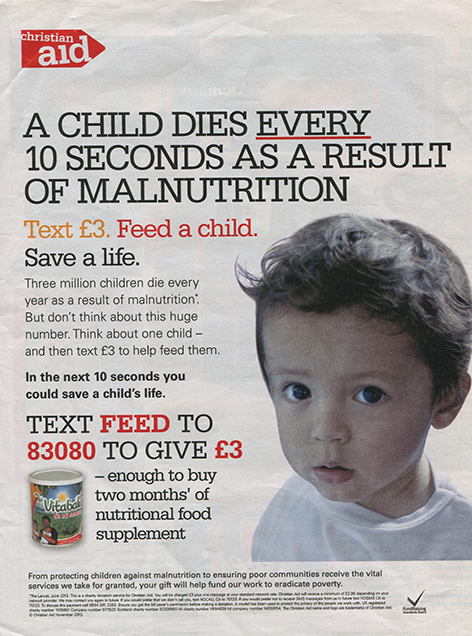
The UK charity, Christian Aid was one of our first long-term funders and is well known for tackling the root causes of poverty. It has few corporate donors and a strict funding policy.
However, like other charities, it is looking for appeals that will be financially successful. Since the sight of a hungry young child soon has people reaching for their purses, its tempting to use messages such as in the advert above. This promotes a fortified nutrition supplement and donors are told that if they donate £3 'In the next 10 seconds you could save a child’s life.'
Christian Aid told us that the aim is to follow through with donors, taking them on a journey where the wider context and complexities of land-grabbing, dispossession, mono-cultures, corporate tax breaks etc are explained. Hmmm, maybe. But doesn't the ad set the scene for the very companies responsible for these problems and whose top strategic priority is to change traditional eating patterns? And what message does the general public receive?
Given the complexity of these issues and the lack of evidence of efficacy (see pg 19 and pg 24) we believe it would be safer if appeals were not based around nutrition products - especially branded ones.
Global trade news
New Zealand pushes 'toddler milks'
The Codex Alimentarius Commission is a UN (WHO/FAO) body that sets global food standards for the composition, quality, safety and labelling of food products. It is an extremely important body that has relevance for many international campaigns. However, few people know of its existence or understand what it does or how it works. One thing is certain, the food industry never ignores Codex and dominates its meetings - eager to legitimize its processed foods and keep the system as unregulated and voluntary as possible. Now that the World Trade Organisation is mandated to refer to Codex Standards in trade disputes, countries may face challenges if they propose legislation that is more restrictive. We have attended Codex meetings since 1995, to ensure that World Health Assembly safeguards are not forgotten.
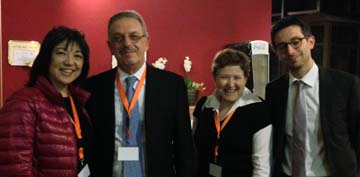
Above: Dr Chizuru Nishida, WHO, Basil Mathioudakis, European Commission. Dr Janet Albert, Food and Agriculture Organisation and Francesco-Felice Carlucci , European Commision.
 There were several important discussions relating to infant and young child feeding this year and IBFAN's position is supported by many developing countries. In July, African nations called for the prohibition of ingredients that may be unfit for human consumption such as cotton seed oil and GM ingredients. The producer nations succeeded in rejecting this call, insisting that 'it was up to each country to decide.'
There were several important discussions relating to infant and young child feeding this year and IBFAN's position is supported by many developing countries. In July, African nations called for the prohibition of ingredients that may be unfit for human consumption such as cotton seed oil and GM ingredients. The producer nations succeeded in rejecting this call, insisting that 'it was up to each country to decide.'
Left: Louis Vareille, Global Affairs Director of Danone and Robert DiGregorio, Nestlé Nutrition, ISDI at the IBFAN's briefing for Member States.
In November, New Zealand, a major formula exporter, led the call for a new standard for formulas for older babies. The German Secretariat, using German privacy laws, had forbidden recording and, in the report writing stage, New Zealand claimed not to recall WHO saying that a new standard was not necessary.
Global trade news
Intimidating governments
Increasingly, trade agreements – shrouded in secrecy – are being used as a way to undermine national policy-making processes. Leaks and exposés show that U.S. negotiators are pushing American corporate interests. On the cards are new intellectual property rights, limits on financial regulation and new investor rights that could require governments to pay compensation for policies that undermine expected profits. If these agreements go through, companies could have the right to sue Governments for economic harm if health or environmental regulations interfere with profits. Scary stuff.
However there are signs that the things may be changing. In January, in response to public concern, the EU Trade Commissioner, announced a public consultation on a future EU-US trade deal, known as the Transatlantic Trade and Investment Partnership (TTIP). And according to a report in Public Citizen about the Trans-Pacific Partnership (TPP) US trade negotiators are becoming remarkably isolated:
A leaked chart detailing countries' positions last month on the most contentious issues shows that the United States stands alone among TPP countries on 1 out of every 4 controversial issues. In each of these contentious areas, all other TPP countries that have taken a position have rejected U.S. demands. If adding issues in which the U.S. position is shared by just one or two of the 11 other negotiating partners, more than 40% of the unresolved issues constitute unpopular demands made by the United States, often at the behest of corporate interests. Such divisions cast doubt on the Obama administration’s ability to meet its stated goal of concluding TPP negotiations this year....
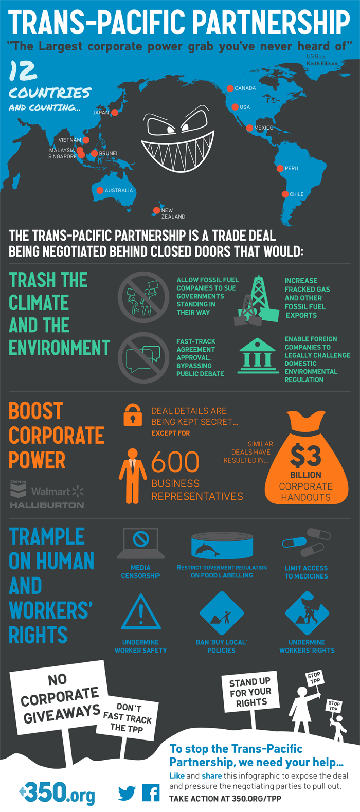
The Kogan Law Group is a New York City–based firm specializing in 'identifying and addressing emerging regulatory, policy, and trade risks posed to multinational company assets, operations, and supply chains.' Kogan, and the 'non profit' Institute for Trade, Standards and Sustainable Development (ITSSD - http://goo.gl/0qTBpa) cleverly use selected parts of trade agreements without recognising that governments have sovereign rights and duties to protect health.
Kogan argues that Hong Kong's draft code, that covers all products for children below 36 months, is not only trade restrictive, but will not protect breastfeeding. He proposes following the example of Australia, New Zealand and the UK - restricting the scope! With enough support governments can counter these flawed arguments and bullying tactics and go on to bring in much needed laws, implementing all WHA Resolutions.
Further reading:
State of Power by Susan George:
Corporate influence in the Post-2015 process Lou Pingeot Global Policy Forum, Misereor and Bread for the World.
Nestlé 'ticked off' for school promotion
EU 'no sponsorship' rule
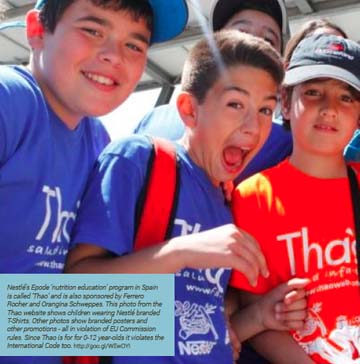
Above: Nestlé’s Epode 'nutrition education' program in Spain is called 'Thao' and is also sponsored by Ferrero Rocher and Orangina Schweppes. This photo from the Thao website shows children wearing Nestlé branded T-Shirts. Other photos show branded posters and other promotions - all in violation of EU Commission rules. Since Thao is for for 0-12 year-olds it violates the International Code too. http://goo.gl/WEwOYl
Member States of the European Union have passed an important Action Plan that for the first time calls for an end to food and drink sponsorship in schools. Since 1992 Nestlé has been sponsoring nutrition education programs in schools all over the world. Together with other NGOs, we have been calling for an end to such promotion which blurs the boundaries between education and marketing and sends a confusing message to children. It builds 'trust' in companies and diverts attention away from irresponsible marketing. Nestlé has admitted that a key purpose of these activities is to improve the company’s reputation and that it uses its Nestlé branding to 'legitimately communicate its social responsible intentions to adults.' The European Commission has confirmed that such activities should not be branded either with product names or with company brand names. The only promotion allowed is in Corporate Social Responsibility reports. The Member States Action Plan goes further calling for no sponsorship by food and drink companies in schools (pg 7).
Contents
Click here to download as a pdf file.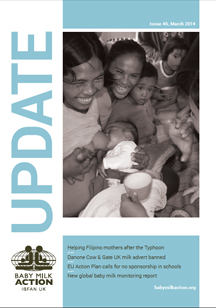
Online version
Click on the links in the contents list below.
You will find 'next page' links at the bottom of each page.
The page numbers follow the printed version.
Page 2
Page 3
(Glossary)
Page 4 - 5
Editorial: Baby Milk Action - developing 2020 vision
Page 6
Nestlé 'ticked off' for school promotion: EU 'no sponsorship' rule
Page 7 - 8: EU News
- Governments take the ‘drivers’ seat’ on child obesity
- Obesity in Europe
- EFSA research renews calls for a ban on claims
Page 9 - 13: UK formula regulation
- Danone dismisses Department of Health rules
- Danone Cow & Gate advert banned
- Tommee Tippee - perfect violation
- Parents ripped off by potentially harmful 'toddler milks'
- Danone offers secret deals to student midwives
- Medela violates the International Code
- The UK sees Nestlé malpractice first hand
- Independent assessment of company information
Page 14 - 15: WHO and commercial influence
Page 16: UNICEF, SUN and Conflicts of Interest
Page 17: Focus on CSR
Page 18: Infant feeding in emergencies
Page 19: New marketing strategies
Page 20: Breaking the Rules 2014
Page 22 -25: Publications, research and news
- What's inappropriate promotion?
- WHO Report on Code monitoring
- Investing in breastfeeding
- WHO Statement on Follow-on Formula
- Flawed research questions breastfeeding benefits
- Human milk protein neutralises HIV
- US child obesity levels decline
- Pope Francis blesses breastfeeding
- Cochrane Review finds no evidence for Ready-to-Use
- Action in Portugal, Ireland and Greece
- Research, transparency and conflicts of interest
Page 26 - 28: Nestlé's Creative Storytelling Venture
- Nestlé 1000 Days initiative aims to boost formula sales
- Action on Nestlé human rights abuses in Colombia
- Mr Brabeck fails to convince as eco-warrior
- Nestlé’s human rights paper
- Nestlé-Free Zone logo merchandise
- Look at what Nestlé does not just what it says
- Formula labels
Page 29: Other Nestlé news
- Nestlé and Google join forces – watch out!!
- H2O molecules for women
- Nestlé Waters takes to youtube
- Waters campaigners win in Ontario
Page 30 - 31: Global trade news
- Intimidating governments
- Impact on baby food marketing
- New Zealand pushes 'toddler milks'
- Spotlight on charity fundraising
Page 32: Resources
- Office Manager's message
- Spot it - Report it!
- Infant Formula Explained DVD and iPhone app
- Thanks to Lara and Sian
- Diary Dates
Editorial
Baby Milk Action - developing 2020 vision
You will see in this issue we have changed our logo and name to highlight we are Baby Milk Action - IBFAN-UK.
This follows a strategic review where we listened to feedback from our members and supporters about our work and website. Soon we will be relaunching our website to follow the style of the new international site for IBFAN – the International Baby Food Action Network.
The food industry in 2020
Thinking of the role Baby Milk Action should play in the year 2020, we had to think first about the challenges and possibilities we will face.
The world is becoming ever more globalised. Nestlé and Danone are locked in a global battle to grow their formula sales (pg 20). China is the main target for growth and the scramble is already on. Nestlé is also expanding its infant nutrition production in Latin America (pg 26).
The food industry has a vision of everyone eating processed foods. It is even trying to set the agenda so that malnourished or undernourished people are fed on commercial products that are traded globally. A better approach may be ensuring they have access to land and the means to grow or buy locally produced food.
The food industry is trying to gain ever more influence over policy setting. We have had a lot of success in raising concerns over Conflicts of Interest (pg 6, pg 7, pg 14). The baby food industry has now lost its position of influence with the World Health Organisation.
So instead companies set up their own parallel initiatives, such as Nestlé’s Creating Shared Value Global Forum (pg 26).
Nestlé and Danone are locked in fierce competition around the world and both have launched First 1000 Days programmes, trying to hi-jack the breastfeeding promotion agenda with the underlying aim of selling more products (pg 26).
Seeds of doubt
Breastfeeding is coming under new types of attack. Companies already claim their formula is based on breastmilk and CLOSE to breastmilk. But we expect they will become less subtle as seeds of doubt planted about breastfeeding take root. Flawed research is already generating 'Is Breast Really Best?' headlines (pg 23). Watch out for suggestions that technology does not have to balance the mother’s needs against the child and so a brave new world where formula-fed babies are superbabies could be around the corner.
Corporate doublespeak
The success of campaigns exposing bad behaviour has prompted many corporations to invest heavily in trying to make themselves look good. Nestlé has become expert in 'talking the talk', while carrying on abusing human rights and environmental standards (pg 27).
Corporate links to charities are a growing concern as well (pg 17, pg 31). Some now just look to what companies say rather than monitoring what they actually do, which is IBFAN's way.
What we should do
Over 350 Baby Milk Action members and supporters completed our online and paper questionnaires to tell us what they think of the organisation and what they think we should be doing. We received a further 100 questionnaires giving opinions on our current website and a proposed new design.
This feedback was used by staff and directors at two planning meetings to answer some key questions about the type of organisation Baby Milk Action should be in the year 2020.
For example, should we continue to be a campaigning group involving the public, or should we be more of a policy think-tank providing expert briefings to policy makers?
The answers to this and other questions are summarised as follows:
● The organisation should have members and involve the public
● It should use campaigns to support its advocacy work.
● It should focus on its international outlook, while being the 'go to' expert organisation in the UK for our issue.
● It should build capacity of the Baby Feeding Law Group (BFLG) to work on UK issues.
● Within IBFAN, it should continue to play a leading role in company campaigns and advocacy.
● Merchandise should continue to play a role in fundraising and outreach, but with greater focus on the unique materials we develop ourselves (pg 12, pg 27, pg 32).
● Some sort of campaign targeting Nestlé AND Danone should be launched as the new Breaking the Rules global monitoring report confirms they are both now significant sources of violations (pg 20).
● We should continue to have an office to provide support to our members and supporters, while digitising our extensive document archive.
Who we are
We asked you about the name Baby Milk Action, our logo, our websites – hence, the changes we are introducing to these.
Our mission statement on page two has also been revised and we have been getting some expert input to the layout and style of our materials – let us know what you think of the new look to this newsletter. When we relaunch our website with our IBFAN-UK identity, it will have a responsive design. This means you will be able to read it more easily on smartphones and tablets as it adjusts to the size of the display.
We need you
Corporations do not have it all their own way– sometimes debates can be started and changes made just by a few people asking questions or taking a stand.
So if you have not done so already, why not become a member, buy some of our merchandise or sign up to receive our campaign alerts?






